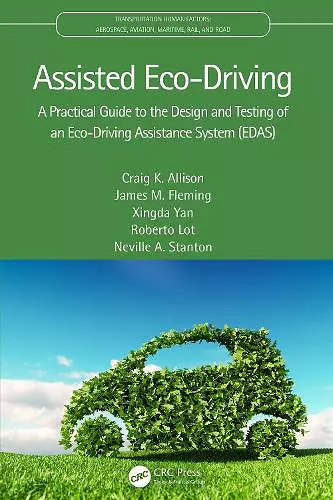Assisted Eco-Driving
A Practical Guide to the Design and Testing of an Eco-Driving Assistance System (EDAS)
James M Fleming author Neville A Stanton author Craig K Allison author Xingda Yan author Roberto Lot author
Format:Hardback
Publisher:Taylor & Francis Ltd
Published:25th Nov '21
Currently unavailable, and unfortunately no date known when it will be back
This hardback is available in another edition too:
- Paperback£59.99(9780367532635)

This book discusses an integrative approach combining Human Factors expertise with Automotive Engineering. It develops an in-depth case study of designing a fuel-efficient driving intervention and offers an examination of an innovative study of feed-forward eco-driving advice.
Assisted Eco-Driving: A Practical Guide to the Design and Testing of an Eco-Driving Assistance System offers an examination of an innovative study of feed-forward eco-driving advice based on current vehicle and road environment status. It presents lessons, insights and utilises a documented scientific and research-led approach to designing novel speed advisory and fuel use minimisation systems suitable for combustion vehicles, hybrids and electric vehicles
The audience consists of system designers and those working with interfaces and interactions, UX, human factors and ergonomics and system engineering. Automotive academics, researchers, and practitioners will also find this book of interest.
‘Assisted Eco-Driving addresses one of the most important topics for transportation
in these times of the threats from climate change: how can we reduce energy consumption
from vehicles. The reduction of energy consumption is important for internal
combustion engines, electric vehicles, and hybrids. For electric vehicles, it can help
to reduce range anxiety as well as reduce the demand on the wider energy production
and transmission system. The authors of this book take a truly multidisciplinary
approach, combining automotive engineering, computer science, and human factors to
show that truly novel solutions will only be forthcoming if all these perspectives are
considered together. They demonstrate this via desktop models, driving simulations,
and, ultimately through on-road studies. This book is a must-read for anyone tackling
the energy crisis in transportation and beyond.’
Professor Mike Regan, University of New South Wales, Australia
‘This book tackles the difficult problem of reducing energy consumption in transportation
by focussing on the interlink between eco-driving and automation. Tools such
from the disciplines of engineering, computer science, and human factors are used to
characterise driver interaction with eco-driving assistance systems with the aim of
reducing energy consumption. In simulator studies and a road trial, the authors showcase
eco-driving assistance solutions to overcome the many design challenges. This
makes this book an excellent contribution to, and inspiration for, fruitful research and
design for user-energy interaction from a multidisciplinary perspective. I can recommend
this book to all those involved in designing systems to reducing energy consumption
in transportation and beyond.’
Professor Thomas Franke, University of Lübeck, Germany
‘This book provides a practical, comprehensive, and multidisciplinary approach to the
design, development, implementation, and evaluation of eco-driving systems. A fundamental
challenge is to design vehicle interfaces that provide sufficient feedback to
drivers to reduce fuel (energy) consumption. A range of methods is used to examine
eco-driving including driver-vehicle modelling, driving simulation, and naturalistic
driving. The authors are leading and award-winning scientists from engineering,
computer science, and human factors who have pushed the boundaries of eco-driving
knowledge forward on multiple fronts. I recommend this book to all those engaged in
tackling the problems faced by human contributions to climate change.’
Professor Jeff K. Caird, University of Calgary, Canada
ISBN: 9780367532628
Dimensions: unknown
Weight: 508g
240 pages